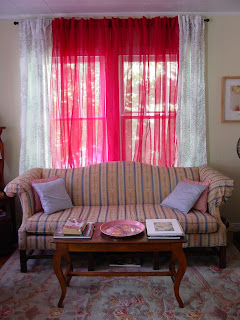
Jack Pendarvis lives a block over from me. While I probably wouldn't knock on his door to borrow some sugar, I still consider him a neighbor because we live near each other and we socially interact.*
Jack is a writer, in fact, a very good one. He spent a lot of time at home writing his recent novel
Awesome, as well as his previous collections of short stories,
Your Body Is Changing and
The Mysterious Secret of the Valuable
Treasure. I'm not doing anything new by interviewing Jack about home. In the last two decades at least three books have been written about writers and their homes. Last year, there was even a fictional book by Brock Clarke (
The Arsonist's Guide to Writers' Homes in New England) that juxtaposed the words writer and home in its title. Writers worked from home long before there was such a thing as telecommuting.
So why interview another writer? It's possible that our idea of home changes over time. What meant one thing to Faulkner, may mean another to Jack.
MW: Where is "home" for you?
JP:
Wherever Theresa is. And some cats.
MW: People seem to exist via their computers. Do you think the idea of
home is over-rated these days?
JP: Homes are nice. I doubt anyone who doesn't have one would say they're overrated!
MW: While you were a John Grisham Visiting Writer last year you lived in the Seymour Lawrence house, which is just down the street from Faulkner's house at Rowan Oak. What was it like living there? You mentioned to me once before that you were relieved to get everything out of storage.
JP: It's strange living in someone else's house. But it's fun going through someone else's stuff!
MW: What do you think makes a home "southern"? Or, is there even such a thing?
JP: I have never been big on this whole "Southern" thing - you know, the thing you have to put in quotation marks. I am Southern. I've always lived here. There are many Southern things I love - particularly some music and some books - but I don't love them BECAUSE they're Southern. I guess what makes our home Southern is all the chicken-on-a-stick bags that drunken college students toss into our yard every night on their way home from somewhere.
MW: Is there something unusual in your household that will never see the light of day at a yard sale?
JP: I like going to yard sales but I'm disappointed if there are no books. Enraged, even! Where are the books??? I don't think I'd ever like to participate in a yard sale on the other end of it, though. I guess I'm a big old hypocrite! It's hard for me to throw things out. When Theresa and I first lived in the same place, she cleaned out a drawer and found candy bar wrappers for candy bars that didn't even exist anymore, that's how old these candy bar wrappers were. And this was after I had told her that I wasn't going to clean out the drawer because I "only save important things."
MW: And finally, can you describe a favorite room in your house?
JP:
We bought what we thought of as a dining room table but at some point we realized that it was the tiniest table ever made. It sort of precludes the possibility of a dinner party. But we have grown to love the little table! It sits in the middle of a room and the room echoes because the tiny table does not absorb sound, I guess. I'm no physicist! Well, it looks nice sitting there all tiny. And there are bookshelves looming and some nice paintings in that room, including a slightly ominous but finally comforting "Ghost Dog" by Jimmy Lee Sudduth. Cats like to sit in that room and look out of windows. All in all, a pleasant room.*Wikipedia











